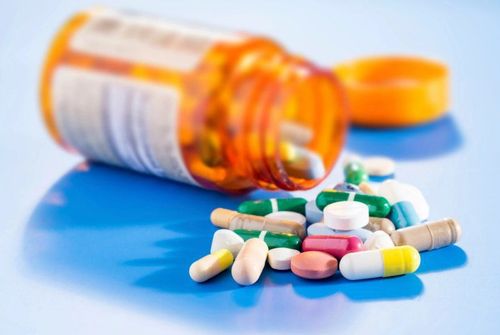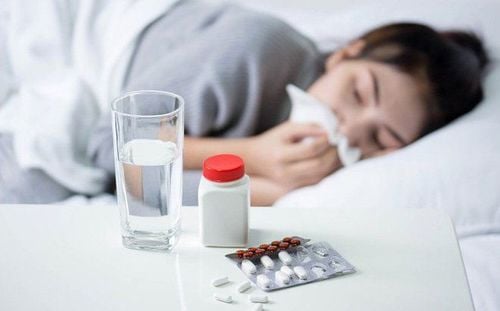This is an automatically translated article.
Antibiotics and anti-inflammatory drugs are the main drugs in the treatment of inflammatory diseases, especially infections of the respiratory tract, ENT, urinary tract... However, for the disease to be treated in remission, If the infection is well resolved, the patient should have certain knowledge about the use of effective and appropriate antibiotics and anti-inflammatory drugs.
1. How to use antibiotics
Antibiotics are drugs that are prescribed to kill bacteria in infectious diseases. Localized foci of infection can be located anywhere on the body. However, if the infection is not controlled with appropriate and effective antibiotics, the bacteria can spread to nearby organs and even the whole body. On the contrary, the improper use or abuse of antibiotics will lead to the risk of antibiotic resistance.
Most of the antibiotics used are systemic and are available in the form of oral tablets or infusions. If the infusion form is only performed in medical facilities, applied to critically ill patients, oral antibiotics are usually prescribed for outpatient use. At this time, patients need to know how to use antibiotics safely and effectively, especially parents who care for young children.
Here are some steps you can take to take antibiotics appropriately at home, both to help you get the best treatment when you're sick, and to protect yourself from the harms of taking antibiotics without a prescription. essential as well as against antibiotic resistance:

Sử dụng thuốc kháng sinh cần theo chỉ định của bác sĩ
Take antibiotics only if you really need them: Antibiotics only have a role in treating some bacterial infections, such as sore throats, diarrhea, urinary tract infections... On the contrary, Antibiotics do not have the same effect on viruses as when a person has the flu, a cold, or a runny nose. Therefore, if you take antibiotics when you don't need them, you run the risk of side effects and can easily develop resistance when you really need them. At this time, the examination is extremely important, the doctor will decide the appropriate treatment. At the same time, never pressure your doctor to prescribe antibiotics. Use antibiotics according to the prescribed dose: Each antibiotic has a different mechanism of action and duration of effect. From there, they have different uses with clearly prescribed dosages, times of day, and days of use. If you miss a dose, take it as soon as you remember. If it is almost time for your next dose, you can take it earlier but do not double the dose. Increasing the dose of antibiotics does not completely increase the effectiveness of killing bacteria, but can increase toxicity to the liver and kidneys - the organs that excrete the drug later. Throw away medicines when not in use and do not share your antibiotics with others. It is completely unacceptable to save medicine for later episodes. The reason is because antibiotics are not self-administered drugs and you always need to see a doctor to diagnose the disease, whether there is an indication to use antibiotics. At the same time, if antibiotics are stored arbitrarily and indiscriminately, it will not only increase the risk of antibiotic resistance in the community, but also can become foreign objects of young children. Monitor and seek medical attention immediately if any side effects or allergic reactions occur while taking antibiotics. In children, a reaction to antibiotics is the most common cause of medication-related hospitalization. The most common side effects are rash, nausea, vomiting, and diarrhea.
2. How to use anti-inflammatory drugs
Anti-inflammatory drugs are pharmaceuticals that have anti-inflammatory effects, support pain relief and reduce fever. Inflammation is not always present in infectious diseases. However, in any infection, when pathogenic bacteria are present in the body, an inflammatory response always occurs. Common symptoms are swelling, heat, redness and pain in the inflamed organ to varying degrees. In some cases, the inflammatory response is so severe that it damages the function of organ systems, sometimes being life-threatening.
Therefore, along with antibiotics, anti-inflammatory is also often used to treat infectious diseases. At the same time, for the treatment to be effective, patients using anti-inflammatory drugs also need certain knowledge:
Only use anti-inflammatory drugs when inflammation occurs excessively, causing discomfort to the patient. In fact, inflammation is the body's beneficial response to colonizing and killing bacteria. Overuse of anti-inflammatory drugs will suppress the function of the immune system. Reduce the dose or stop the drug completely when the inflammation has improved. With long-term use, anti-inflammatory drugs can damage the mucous membranes of the gastrointestinal tract and cause intestinal bleeding. Adhere to the correct dose and number of times a day. If you forget a dose, take it as soon as you remember. If it is almost time for your next dose, skip this one. Do not double the dose because the effect is not more than the side effects are increased significantly. Take only one anti-inflammatory drug in standard doses for one episode. Taking two or more different types of anti-inflammatory pain relievers at the same time will not improve pain relief and may contribute to symptoms that are more harmful to the body. Tell your doctor if you have signs such as contraindications to the use of anti-inflammatory painkillers including allergy or sensitivity to the drug, previous gastrointestinal bleeding, kidney or liver failure, severe heart failure ...

Lạm dụng thuốc kháng sinh có thể gây ức chế hệ thống miễn dịch
3. How to stay healthy to limit drug use?
To limit the use of antibiotics and anti-inflammatory drugs, you need to actively protect your health, increase resistance to resist the attack of microbial agents from the environment outside the body.
Accordingly, there are steps you can take to prevent yourself and your loved ones from getting sick, including:
Regularly wash your hands with sanitizer or soap under running water. Wear a mask properly when going out in public. Cover your mouth and nose when coughing or sneezing with your elbow or a disposable tissue. Isolate at home when you have a fever, flu or respiratory infection. Avoid touching your eyes, nose, and mouth with unwashed hands. Avoid gathering in crowded places. Avoid close contact with people with colds or respiratory infections. Get a yearly flu shot for children, the elderly, pregnant women, or people with chronic illnesses. Build a scientific diet, lots of green vegetables and fruits, drink enough water. Have a balanced schedule between work, study and rest. Limit stress. Get enough sleep.

Ngủ đủ giấc giúp cơ thể khỏe mạnh hơn
In short, using effective and appropriate antibiotics and anti-inflammatory drugs is simply taking them exactly as prescribed by your doctor; do not abuse drugs and do not voluntarily quit smoking. Only by doing so, combining more ways to help increase the body's resistance, can you confidently protect good health for yourself and your loved ones.
Please dial HOTLINE for more information or register for an appointment HERE. Download MyVinmec app to make appointments faster and to manage your bookings easily.
References: mayoclinic.org, cdc.gov












